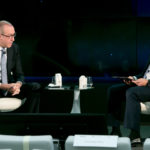Onur Genç: “The sale of the U.S. subsidiary gives us extensive optionality. We will only participate in operations that create value for shareholders”
The sale of the U.S. subsidiary is “an extraordinary agreement” for everyone, as it “creates enormous value for shareholders and gives us a wide range of strategic options,” BBVA CEO Onur Genç said during his presentation this Wednesday at the 27th Financial Sector Meeting organized by Deloitte, Spanish daily ABC and Sociedad de Tasación. In this regard, he noted that “we will only participate in operations that create value for shareholders.” “We aren’t in a rush,” he added.

Press kit
- Download video for web (WeTransfer)
- Statements from Onur Genç (WeTransfer)
- Statements from Onur Genç (YouTube)
- Statements from Onur Genç (Audio)
- Statements from Onur Genç - Audio (WeTransfer)
- BBVA CEO Onur Genç during his presentation (JPG)
- José Manuel Domínguez Carravilla, a partner at Deloitte, and BBVA CEO Onur Genç. (JPG)
Onur Genç participated in a discussion with José Manuel Domínguez Carravilla, a partner at Deloitte. Regarding the various strategic options BBVA is considering, he referred to the possibility of a share buyback¹ because it is “very attractive at current prices”, but after the U.S. operation is closed and once the regulator lifts the restrictions on shareholder remuneration, following shareholder approval.
Concerning the talks with Sabadell, he recalled that BBVA always analyzes all opportunities. “We respect our competitors and Sabadell is clearly one of them.” In his opinion, the relevant event is very clear: “It doesn’t mean that any decision has been made and there is no certainty that a decision will be made,” he said. “We are in the early stages of the analysis process,” he explained. “As we have demonstrated with the U.S. agreement, we are value-focused.” And in the case of Sabadell, “we will not agree to the deal unless there is value in it for our stakeholders.” On this note, he recalled that “we have a 15 percent market share in Spain,” thus “we will only do it if it generates value for shareholders.”
Genç explained that the operation of selling the U.S. subsidiary reinforces BBVA’s already strong financial position and opens the door to a wide range of options to be able to invest that capital in a profitable manner in the markets where the bank has a presence, and simultaneously be able to increase shareholder remuneration. Following the operation, the bank will have nearly 600 excess basis points over the capital requirement and that means there is an extensive optionality to use this buffer. “There are many opportunities to compete for this capital,” he stressed. Share buybacks at the current price levels is one of these options because “it creates a lot of value for our shareholders.” Second, “investing in our main markets” where “the Sabadell M&A operation will compete with these options.” In any case, he clarified that “we aren’t in a rush” to make decisions. “We have to look at this opportunity in the context of the many other things that we can do with the flexibility that the sale of the U.S. subsidiary provides us.”
BBVA’s CEO underscored that the sale of the U.S. franchise for $11.6 billion in cash (€9.7 billion at an exchange rate of $1.20 dollars per euro) took place at a very attractive price. This figure represents 19.7 times the result obtained for the unit in 2019 and 2.5 times the assigned value from analyst consensus by adding the components of the franchise. Furthermore, the operation will have a positive impact on BBVA’s CET1 ‘fully loaded’ capital ratio of nearly 300 basis points - equivalent to a €8.5 billion generation of CET1. “It is a great operation” for everyone, he emphasized.

José Manuel Domínguez Carravilla, a partner at Deloitte, and BBVA CEO Onur Genç.
The impact of the pandemic on the banking sector
BBVA’s CEO reflected on the current crisis, which he feels is “heterogeneous” and of “limited duration” compared to the 2008 crisis. Although “many uncertainties” remain, Onur Genç indicated that certain signs of economic recovery are starting to be seen, as demonstrated by bank customers’ card expenditures, which in some countries is returning to pre-pandemic levels, and even higher. In his opinion, the banking sector is facing this crisis from a position of strength, with the best capital and liquidity levels of the past decade. The financial sector has supported the economy through instruments like loan moratoriums while public institutions have adopted measures to ensure that banks can continue lending and helping families and businesses mitigate the impact of the crisis. “The governments have taken appropriate measures,” he said.
He feels that as the economy recovers, it is important to implement a gradual exit strategy in order to avoid compromising the economic recovery. Genç recalled that the sector already front-loaded sufficient provisions in the first quarters of 2020 in anticipation of a deterioration of loan quality.
The financial sector in a post-COVID scenario
BBVA’s CEO explained that the pandemic accelerated certain tendencies that were already taking shape in the banking industry. Of them, he referred to digitization and technology - “where BBVA has been a pioneer by starting to invest before everyone else” - the data-based economy, and sustainability. “I think that banks can play a big role in the transition toward a sustainable future, not only from the standpoint of measuring risks, but also from the prospects of new opportunities created by new sectors,” he said.